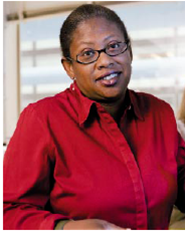Podcast: Play in new window | Download
Subscribe: Apple Podcasts | RSS
Dr. Bonney is a Professor and Director of the Research Division in the Department of Obstetrics, Gynecology and Reproductive Sciences at the University of Vermont. She received her Bachelor’s degree in Chemical Engineering from the University of Minnesota and went on to earn her MD from Stanford University. Afterward, Dr. Bonney completed her Residency at Harvard University followed by a Fellowship in Immunology at the National Institutes of Health. Dr. Bonney served on the faculty at Emory University before joining the faculty at the University of Vermont. She recently received her MPH from the Harvard School of Public Health. Dr. Bonney is a Fellow of the American Congress of Obstetricians and Gynecologists and has been awarded the Association of Professors of Obstetrics and Gynecology Teaching Award. Dr. Bonney joined us to talk more about her life and her work.
People Behind the Science Podcast Show Notes
Life Outside of Science (2:20)
Elizabeth is an enthusiastic gardener in her spare time. She has been cultivating carrots, radishes, herbs, mint, and more in her garden.
The Scientific Side (3:03)
Dr. Bonney studies the immune systems of pregnant women. She is trying to understand why the female body doesn’t reject the growing baby, even though it carries unfamiliar proteins from the father.
A Dose of Motivation (4:04)
“Discipline will set you free.”
“Science is 90% perspiration and 10% elation when it’s good.”
What Got You Hooked on Science? (9:58)
When she was a kid, Elizabeth was an avid bug collector and enjoyed playing with toy cars. She was fascinated by biology and physics from an early age. In junior high school, Dr. Bonney was immersed in languages, learning Latin, German, Spanish, and French. Her father persuaded her to pursue biological sciences in college, and she started off as a pre-med major, but soon switched to engineering.
The Low Points: Failures and Challenges (22:40)
One frustration in science that Dr. Bonney has encountered is when she does an experiment and another research group does the same experiment, but they get two different answers. The groups may bicker a lot about who did what wrong to try to explain the different results. The reality is that they likely did not do exactly the same experiment and they just have to sort out what was different.
A Shining Success! (25:55)
Dr. Bonney considers some of her most important successes to be the people she has helped along the way. For example, she worked very hard to help a particular student who was really struggling, and when this person graduated, Elizabeth was asked to hood the student in the ceremony. This was a really rewarding experience, and she enjoys being able to mentor students as part of her career.
Book Recommendations (28:40)
The Brief Wondrous Life of Oscar Wao by Junot Diaz, This is How You Lose Her by Junot Díaz, Open Veins of Latin America: Five Centuries of the Pillage of a Continent by Eduardo Galeano, The Alchemist by Paulo Coelho
Most Treasured Travel (30:40)
Elizabeth loved the trip she was able to take to La Réunion, a French island off the coast of Madagascar. There was a great meeting there where researchers were discussing preeclampsia, a condition in pregnant women. The people were wonderful there, and she enjoyed having the opportunity to speak French.
Quirky Traditions and Funny Memories (32:30)
When Dr. Bonney was in medical school, they had a lot of fun with their strong work hard, play hard lifestyles. She and her cohort would get up early, go into lab, work until 10 pm, go out and party until 3 or 4 am, and then be back in the lab the next day.
Advice For Us All (36:30)
Take Care of Yourself.
Guest Bio
The overall goal of the Bonney laboratory is to determine if pregnancy changes the rules by which the immune system is regulated. The Bonney laboratory uses mouse models to determine the regulation of immunity during pregnancy and champions the idea maternal immune suppression is not critical to successful pregnancy. Her laboratory also seeks to uncover the immune system-related factors that prevent premature birth and has contributed to the idea that T cells are part of a regulatory loop that may be deficient in this disease. The recent focus of her laboratory has been the regulation of T cell homeostasis during pregnancy and the particular role of cytokines such as interleukin 15, 7 and 10 and molecules such as Fas and Programmed Death 1. Further, she is interested in the role T cell homeostasis plays in resistance to preterm birth, persistent viral (lymphocytic choriomeningitis virus) infection in the placenta, the vascular biology of pregnancy, and the post-partum susceptibility to autoimmune disease. In addition, she seeks to determine the role of T cell homeostasis in adverse pregnancy in humans. With members of the Vermont Center for Immunology, Dr. Bonney is also studying neonatal immunity to influenza. Her laboratory is adept with the use of animal models and basic techniques in immunology. Dr. Bonney has served as an ad hoc member on both the Human Embryology and the Cellular and Molecular Integrative Reproduction Study Sections and was a standing member of the Infectious Diseases, Reproductive Health, Asthma and Pulmonary Conditions Study Section. She remains active in clinical medicine and enjoys delivering babies and helping women with pelvic pain. She has been awarded grants from the National Science Foundation, the National Institutes of Health, and the March of Dimes. Over the years, Dr. Bonney has mentored over forty trainees from undergraduates to junior faculty. As a woman of color she is quite aware of the obstacles faced by minority and women scientists and has consistently served as a role model, sounding board and advisor with the intent to help these scientists overcome these obstacles. She is fond of asking “What’s the story?” and enjoys her garden and long walks.
*This episode was originally published on July 10, 2015.

Leave a Reply